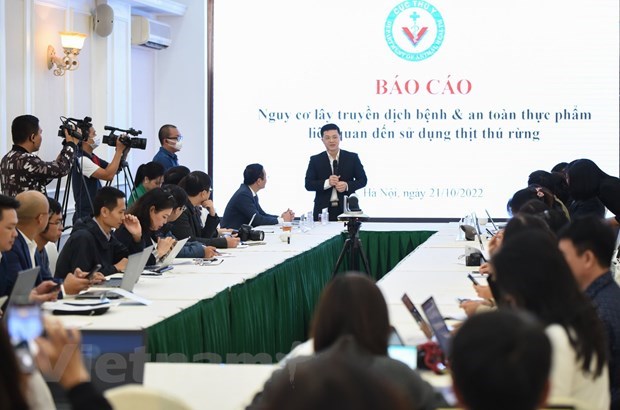WWF: Communications campaign to change behaviour of consuming wild meat
A communications campaign to change the behaviour of consuming wild meat by urban dwellers from now to November 2022 in Vietnam, Laos and Cambodia.
 Pangolins are among the most poached and consumed. (Photo: VietnamPlus)
Pangolins are among the most poached and consumed. (Photo: VietnamPlus)The campaign, financed by the WWF-US and implemented jointly by the WWF-Vietnam, the International Cooperation Department and the Vietnam Agriculture Newspaper under the Ministry of Agriculture and Rural Development, will be held from now to November 2022 in Vietnam, Laos and Cambodia.
It will include various online and offline activities to approach target people to help them change their behaviour of consuming wild meat, especially civets, monkeys and pangolins, which are the most consumed.
At a press conference to launch the campaign held on October 21, WWF-Vietnam country director Van Ngoc Thinh said the WWF has come to recognise that Laos, Vietnam and Cambodia are the three countries with high levels of consuming wild meat, where mammals and birds are offered in a high quantity in markets and restaurants.
A study by the WWF and GlobeScan conducted in 2021 in Vietnam, Thailand, Myanmar, Japan, China, and the US found that 7% of the people asked said they or someone they know have bought products originating from wild animals sold in markets. It is of special note that 9% of the people who had bought said they night and will buy wild animal products again in the coming time.
Meanwhile, most new contagious diseases now originate from animals and catch on humans, such as SARS, MERS, H1NA, H5N1, and monkeypox. So, it is reasonable to say that the trade of wild animals is posing a danger of causing tragedies and serious threats to the environment and wild animals and human health and safety.
 WWF-Vietnam representative speaks at the conference. (Photo: VietnamPlus)
WWF-Vietnam representative speaks at the conference. (Photo: VietnamPlus)“That is why, through this campaign, we hope the target group of people come to understand that consuming wild meats is not worth it and to place the health of themselves and the whole community at risk, as the behaviour can cause and spread diseases from animals to human beings,” he said.
The representative also drew attention to the fact that although animals are not the main cause of the outbreaks of diseases, it is hard for them to threaten human beings with their diseases when they live in the natural environment. He pointed out that the especially dangerous behaviours of the top risk are poaching, trafficking, processing and consuming wild meat.
Jan Vertefeyuille, a senior advisor of the WWF-US, said although it is impossible to pinpoint where new pandemics will break out, it is confirmed that the behaviours like consuming wild meat are increasing the danger of spreading contagious from animals to human beings.
That is why the approach to the consumers to change their behaviours in this campaign is of great need to change the perception of society on consuming wild meat and to prevent the danger of the next pandemic outbreak, the official stressed.
WWF was one of the first international non-government organisations working in Vietnam. In 1985, WWF began working on a national conservation strategy and since then has worked closely with the Vietnamese Government on a diverse range of environmental issues and implemented field activities across the country./.













